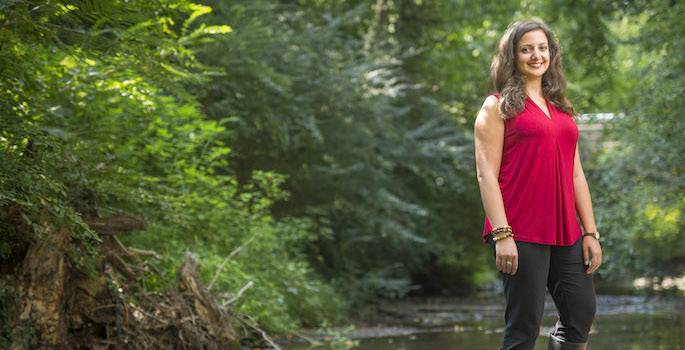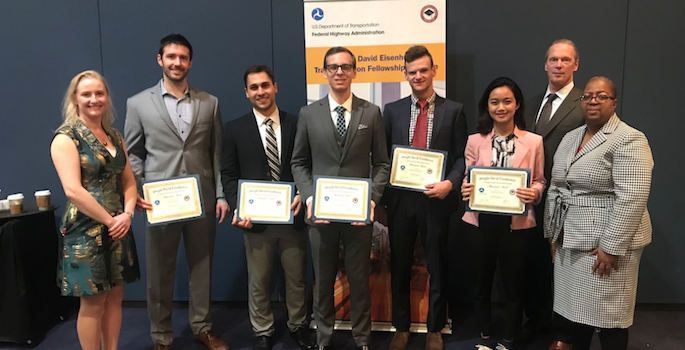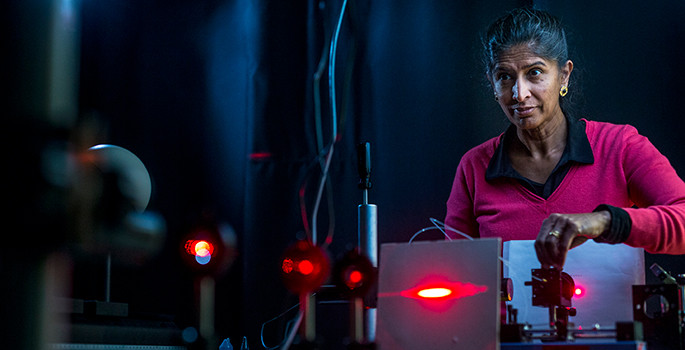News
-

Team makes breakthrough in separation science with sub-Angstrom precision
An international research team that includes Vanderbilt engineers is the first to successfully separate two ions with very, very small size differences, a major advancement in separation science with widespread potential application. Read MoreApr 24, 2020
-

Class project leads to a paper in peer reviewed international journal
The paper, sharing findings from a study of pyrite nanoparticles led by undergraduate mechanical engineering student Masahiro Kato and Ph.D. students Nicole Moering and Madeleine Fort, appeared this week in Materials Today Advances. Read MoreApr 17, 2020
-

Baroud receives NSF Early CAREER Award to predict and inform community hazard response
Hiba Baroud has received a 2020 NSF Faculty Early CAREER Development grant to boost community resilience and sustainability through a three-pronged project that starts with a better understanding of how people and infrastructures interact during hazards. Read MoreMar 11, 2020
-

Vanderbilt engineers mine EMRs and clinical journals for novel disease associations and new research paths
A new tool developed by Vanderbilt engineers, in collaboration with clinical and informatic experts, can unearth novel co-morbidities from routinely collected, anonymized electronic medical records. Read MoreFeb 18, 2020
-

Vanderbilt University, L3Harris Technologies collaborate to advance engineers’ space survivability design, analysis, and test skills
A five-year partnership with Vanderbilt University’s Institute for Space and Defense Electronics will leverage the expertise of ISDE engineers and faculty members within the Vanderbilt School of Engineering to create a ready source of technological updates for all L3Harris radiation effects engineers. Read MoreFeb 13, 2020
-

Oguz uses ACCRE supercomputer daily for medical image analysis
For 17 years, Vanderbilt students and researchers have analyzed data with a method much faster than any normal laptop: a supercomputer steps away from the Commons Center. The Advanced Computing Center for Research and Education (ACCRE), which originated in 2003, is housed in the Hill Center. Read MoreJan 30, 2020
-

‘Film Detective’ helps kids with autism interpret actors’ actions
Maithilee Kunda and postdoc Roxanne Rashedi have developed a game called Film Detective to help adolescents on the autism spectrum learn to decode social scenarios. Read MoreJan 27, 2020
-

Five graduate students named Eisenhower Fellows
Five engineering Ph.D. students have received prestigious Dwight David Eisenhower Transportation Fellowships and one of them was named the top Eisenhower Fellow in the U.S. Read MoreJan 21, 2020
-

Engineers advance efforts to speed blood test results
Vanderbilt engineers are working on a process that ultimately may allow patients to get blood test results fast. Read MoreJan 13, 2020
-

Kidambi receives NSH Early Career Award to support atomically thin membrane research
Piran Kidambi has received a 2020 National Science Foundation Faculty Early Career Development grant. Read MoreJan 10, 2020
-

Vanderbilt mechanical engineers earn top materials research awards
Vanderbilt mechanical engineers took home top awards at the Dec. 6 meeting of the Materials Research Society in Boston, Massachusetts. Mechanical engineering professor Kelsey Hatzell received the Materials Research Society Nelson “Buck” Robinson Science and Technology Award for Renewable Energy. Hatzell was selected from more than 25 candidates for her research contributions to renewable energy.... Read MoreDec 13, 2019
-

Gore named to committee on worker health overseas
John Gore, director of the Vanderbilt University Institute of Imaging Science, has been appointed to a National Academies of Sciences, Engineering and Medicine standing committee to advise the Department of State on unexplained health effects on U.S. government employees and their families at overseas embassies. Read MoreDec 12, 2019
-

Neuromodulation device studied as non-addictive option for chronic pain
With $3.6 million in funding, researchers from the Vanderbilt University Institute of Imaging Science are developing a focused ultrasound neuromodulation device as a non-invasive and non-addictive method for treating chronic pain. Read MoreNov 11, 2019
-

Valentine named Vanderbilt faculty liaison with ORNL
The Oak Ridge National Laboratory collaboration with Vanderbilt University will grow stronger through a new faculty liaison—a School of Engineering professor—and enhanced management of travel assistance awards. Read MoreNov 8, 2019
-

Vanderbilt Rocketeers take on the 2020 NASA Space Robotics Challenge
A 25-member engineering team—13 seniors, 9 undergraduates and three graduate students—in the Vanderbilt Aerospace Design Laboratory is taking on the 2020 NASA Student Launch challenge. Read MoreNov 7, 2019
-

How to fake a medical record in order to mitigate privacy risks
In machine learning, generative adversarial networks (GANs) involve two artificial neural networks squaring off, one, the generator, trying to delude the other, the discriminator, into accepting synthetic data as real. Beyond their science and engineering applications, GANs can generate utterly convincing “photographs” of people who do not exist. Unrestricted use on a wide scale of... Read MoreNov 4, 2019
-

Vanderbilt team wins $1M in DARPA spectrum challenge finale
In a final five-minute flurry, MarmotE watched its lead slip. At the buzzer, the team placed second and won $1 million in the DARPA Spectrum Collaboration Challenge. The team of four researchers, now very close friends, have worked together since 2016 to create an AI-radio system that can manage the wireless spectrum, finding unused slices... Read MoreOct 29, 2019
-

Biophotonics device for parathyroid I.D. is a R&D 100 Awards finalist
An optical imaging technology developed by Orrin H. Ingram Professor of Biomedical Engineering Anita Mahadevan-Jansen and her group, in partnership with a medical device company, has been selected as a finalist for the 2019 R&D 100 Awards. Read MoreOct 28, 2019
-

Alert system for failing nuclear plant pipes uses thin films and sound vibrations
A failing pipe can be tough to spot. It may cause a puddle, produce another sign of damage, or simply burst before detection. A flooded kitchen or laundry room is messy and inconvenient, but the stakes are much, much higher in nuclear power plants – which on average contain many miles of pipeline. As concern... Read MoreOct 24, 2019
-

Smart City project gives Nashville data-based planning tools
Vanderbilt researchers have discovered a vortex—and this one has nothing to do with icy, polar weather. Working with the Nashville Fire Department and Davidson County Information Technology Services, a team of Vanderbilt computer scientists and engineers analyzed more than three years of NFD incident data. The team looked at location, time and type of incidents... Read MoreOct 17, 2019